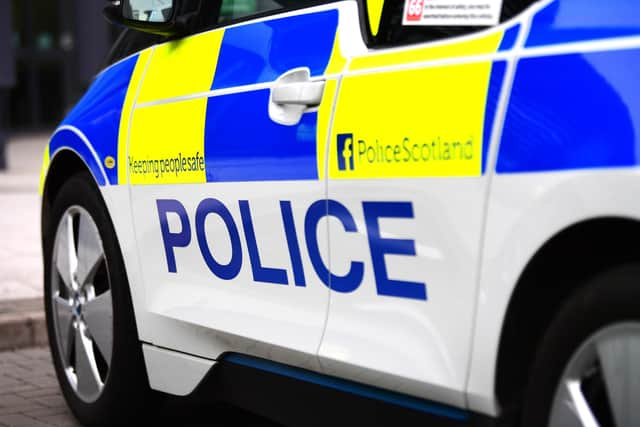'Green' electric vehicles cannot be used by Police Scotland despite £25m investment
Police Scotland is gearing up to become the first blue light service in the UK to switch its entire fleet of around 3,500 vehicles from fossil fuel to ultra-low emissions cars, but has admitted the vehicles are not being used for core emergency response duties.
The admission comes amid question marks over the suitability of electric cars to the demands of frontline police work in terms of efficiency and practicality, with the prospect of electric police vehicles running out of battery mid operation, coupled with ongoing concerns over too few charging points country wide.
Advertisement
Hide AdAdvertisement
Hide AdSouth of the border, Gloucester Constabulary has switched 21 per cent of its vehicles to electric, but Chris Nelson, Conservative Police and Crime Commissioner, has said officers driving the vehicles experienced difficulties finding chargers, especially in rural areas and that cars were in danger of "running out of puff".


Around 26 per cent of Police Scotland's vehicles are ultra-low emission (ULEV). The force is pressing ahead to be fully ULEV by 2030 in line with Scottish Government recommendations, phasing out diesel and petrol motors over the next five years.
Almost 40 per cent of Police Scotland’s "green" vehicles are unmarked.
Electric police cars risk running out of charge when responding to emergencies because blue lights, sirens and police radios drain the batteries and, given the length of time it takes to recharge vehicles, mean officers would have to divert time to picking up another vehicle, seriously inhibiting them from fulfilling their duties.
This could be particularly problematic in many parts of Scotland, such as the Highlands and other rural areas, where patrol cars have to cover large distances, often in adverse weather conditions, which also places an additional drain on electric batteries with heaters, wipers and blowers in constant use.
A Police Scotland spokesperson said: "Our Fleet Strategy has a vision to operate and maintain a class-leading, future-proof and sustainable ULEV fleet, which is technologically advanced and will meet operational requirements.
"A gradual rollout of electric vehicles across the country is ongoing, and until the necessary infrastructure is in place, we have ensured none are used for urgent calls and are instead utilised for general purpose or non-response roles.”
Meanwhile, work is ongoing with the roll-out of a dedicated Police Scotland charging infrastructure across the country, with a number of large sites completed and is set to continue from the Central Belt up to the Highlands and Islands.
Advertisement
Hide AdAdvertisement
Hide AdThe latest Police Scotland quarterly performance report says ULEV vehicles are in stock and on order and are being allocated as charging sites are completed, with training for all fleet staff on ULEV vehicle maintenance and repair also having been completed.
The report says: "Fleet is currently reviewing its Target Operating Model as we move to ULEV as there is a different skill required in ULEV vehicles. As the vehicle becomes the office and technology increases, and with less moving parts in a ULEV more mobile servicing will be the future.
"This will ensure our vehicles are replaced in line with the Police Scotland Fleet Strategy to have a fit for purpose modern fleet."
Last year, it emerged Police Scotland had invested in electric vehicles, but not in chargers to allow them to be put into operation. It was revealed at least 20 police stations across the country had the new cars, but officers were unable to recharge them on site, meaning they were reliant on partner organisations and public plugs.
Figures unearthed by the Scottish Liberal Democrats found 23 police stations had the environmentally friendly cars, but no charging points.